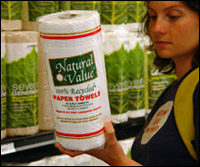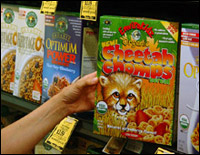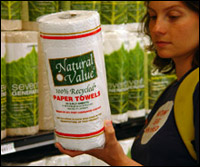“I don’t trust ‘natural.’ People are always dying of natural causes.”
— Woman looking at food labels, in a Richard Guindon cartoon

Roll playing games?
Photo: Laura Cacho.
Shoppers of the world, I have just one question: Are you an eco-chump?
Lots of us try to shop green. We buy unbleached paper towels and recycled products, some with more than 5 percent post-consumer content. Commend McDonald’s for banning Styrofoam, and shun them for lying about beef fat in the fries. Save our paychecks because we suffer from Prius envy. Wouldn’t be caught dead at Wal-Mart because, well, it’s Wal-Mart.
But a green consumer is still a consumer, and the evil marketing geniuses who run the world know this. They prey on our longings: love your mother, do well by doing good, live simply that others may simply live … They put symbols of renewal on plastic packaging. They market products with terms the FDA has yet to define. They overcharge, because they know eco-chumps pay more, eagerly, if it helps us feel a reverent connection with all things.
I know just when I started to feel like one of Barnum’s one-a-minutes. Years ago, our bathroom sink started draining slowly, and my wife ordered some eco-friendly drain cleaner from a catalog. What showed up looked like it belonged less in the pipes than in the hamster cage. Earnestly we read and followed the instructions, which directed us to dump this mish-mash of twigs and dirt down the drain and wait for its magical, bio-logical cleaning action to take place.
Patience has never been my long suit. After half an hour of watching the water refuse to drain from our little Zen bog, I grabbed a wrench and removed the J-trap, now clogged with enough humus to cover the floor of an ancient bonsai forest. Then I dumped the whole mess in the compost bin. The incantation I muttered lacked reverence.
Look, we’re all vulnerable. The armies of progressive shoppers mulling which species they should unendanger this week by overpaying for cereal (“What’ll it be, kids: Gorilla Munch or Cheetah Chomps?”) are motivated by a noble impulse, and it’s not one I mean to discourage. All I’m promoting is a bit of viridis caveat emptor (with apologies to the Latin professor I never had): green buyer, beware.

So good, and so good for your planet.
Photo: Laura Cacho.
Because if you’ve ever paid $8 for toilet-bowl cleaner, you might be an eco-chump.
If you pay extra for coffee beans that grew in the shade of trees providing endangered-species habitat, you might be an eco-chump.
If you wear clothing made from hemp — or from wool shed by carefree Andean llamas and gathered between 9 and 5 by indigenous folk in native garb who have dental coverage, get regular breaks, and harvest earth’s bounty using customs learned from their ancestors — you might be an eco-chump.
What to do? It’s been said that you have to work within the system to effectively change it. Of course, it’s also been said that doing so makes you a sellout, man. And this conflict gets to the heart of the issue.
Take a long-standing addiction of mine: Nacho Cheese Doritos®. Normally I avoid artificial flavors and colors (especially public carcinogenemy No. 1, Yellow #5) with an obsession verging on the pathological, but Doritos are a weak spot. Now the green-marketing wizards have saved me from myself: enter Natural White Nacho Cheese Doritos.
In test markets, these organic white-corn spin-offs are flying off the shelves. People are snapping them up, and no wonder; read the back copy, targeted toward chumpish you and me: “You want to bring home the best for yourself and your family. That’s why your favorite Frito-Lay brands are going natural.” The term “natural” appears on the bag in some form, including inch-high capital letters, no fewer than eight times. That term remains undefined by the FDA … naturally.
I’d guess Frito-Lay, headquartered in Texas and an arm of the gigantic multinational conglomerate PepsiCo, is a big donor to, shall we say, unsympathetic causes. Yet the company wants to reach across the grocery aisle into blue-state food co-ops, riffling through hemp wallets in search of the almighty dollar.
If I buy these chips, am I chumping at the bit, or changing the world? While companies like this pick our pockets, can we change their ways? Think about it: a billion-dollar Texas corporation is considering, however cynically, doing business differently. It’s up to us to ensure capitalist exploitation goes both directions.
If we create demand for consumer goods that champion our goals, we start the corporate world on the long journey toward sustainability. Encouraging them to take this path can make us — dare I say it — eco-champs.
After all, the journey of a thousand miles begins with a single chip.


